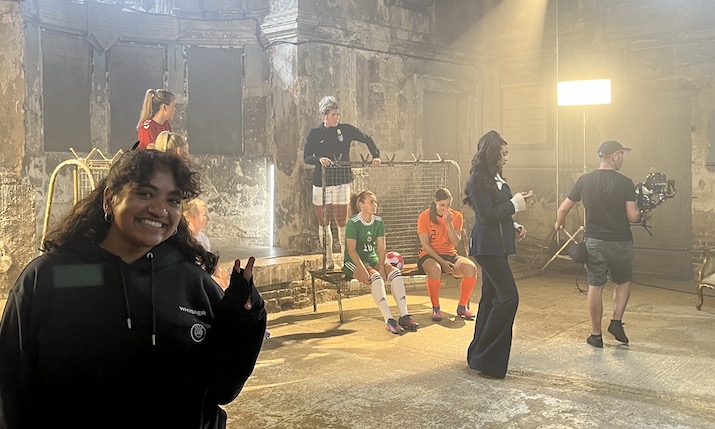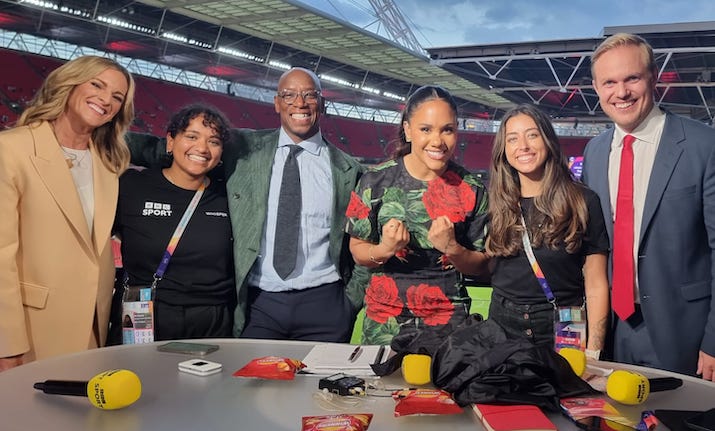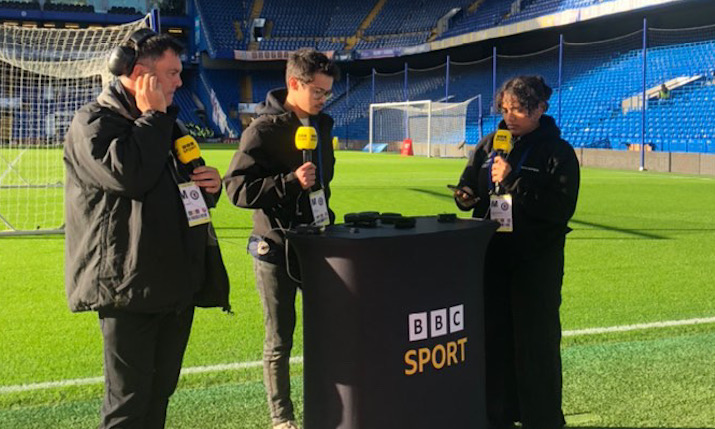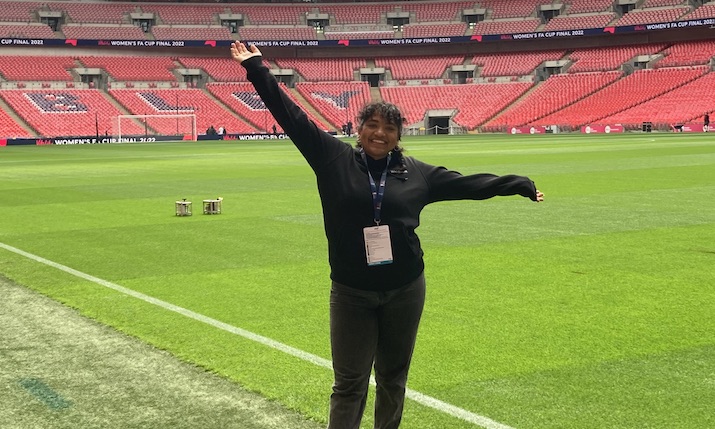Stepping Stones: Whisper’s production team assistant Georgia De Souza on persevering despite the challenges

On the set for the Women’s Euro Title Shoot
By Georgia De Souza, production team assistant, Whisper
What was challenging about getting into this industry, how did you push yourself through that?
Getting into the industry can be difficult and self-deflating. I spent a year working in retail applying for TV jobs, most of which I didn’t have enough experience for, or didn’t get a response from. But perseverance is key in the industry and as soon as you get your foot in the door, the whole room opens.
For me I gave everything a go. When I started as a runner at Whisper I spoke to everyone and tried to get myself on as many shoots as possible, especially if it was to do with women’s football, but I always made sure I said yes to any opportunity that came my way. I made sure that people knew who I was and that I had a good reputation, always willing to learn and help.
I asked to assist on WSL matches while a runner and by my third month I was working on the Women’s FA Cup Semi Final.
As I learned more about the production management side of things, I felt it was the area for me as I’ve always been good at organising.
By Christmas a spot on the WSL team opened, and I was offered a job as team assistant. My role consists mainly of organising logistics: making sure talent arrive onsite, are in hair and make-up and ready to rehearse on time, and most importantly that crew are booked, and fed. I act as one of the links between clubs, stadium and our broadcast team.
What’s it like to work in TV today?
The pace of live TV can be quite intense, and over the past year it has challenged me to cope under pressure. My first month as a team assistant was hard; there was one week where we had four games in the space of eight days. It was a baptism of fire and it made me learn the role quicker than I could imagine.
How did you find out about sports broadcasting as a career?
It wasn’t until I applied for a work experience scheme with Whisper through my university that I become aware of a career in sports television. I had just got back into football and saw that Whisper produced the Women’s Football Show on the BBC.
I applied for the Whisper scheme in order to learn more about TV broadcasting and to see a side that I never got shown during my time at university. I like sports broadcasting as I believe live sport will always be in demand.

After the Women’s Euros Final with the presenting team
I studied creative subjects at school – Drama, Media, English – and then went onto do a Film, TV and Digital Production degree at Royal Holloway and graduated with a First Class Honours.
My second and third year of university heavily revolved around my participation in the women’s football team; the 2019 World Cup had just taken place as I headed into my third year and I started following the Women’s Super League.
What was your first job and how did you get it?
A placement and subsequent job as a runner at Whisper was my first job. In my third year at uni I applied for a work experience scheme with Whisper. They were producing the Women’s Football Show – a show I would tune into every Sunday evening – and I instantly knew I wanted to work there.
I was linked with Whisper’s Women’s Football Show senior producer and initially planned to do some work experience, but it was interrupted by COVID. A few months later they were looking for runners, I applied and was asked to do a four-week placement, and I put myself forward for anything women’s football that was available. After the four weeks they offered me a contract and I haven’t looked back since.
One of my first shoots during my placement was the C4 F1 show Silverstone Opener with Tom Cruise – it was incredible! That got me excited about working in TV, and within those four weeks I knew that this was the career for me. In my six months as a runner at Whisper, I gained a lot of experience, working on the Paralympics, Bellator for BBC Three and some more F1 shoots.
The Women’s Euros was the most rewarding yet the most challenging job I have done. I was helping to organise logistics for 31 matches with over 15 members of the presenting team, a few coming from outside of England.

Tech run, pitchside at Stamford Bridge for WSL Chelsea v Tottenham
That final whistle claiming England as official champions of Europe made me ecstatic. And as Gabby Logan’s closing line was said, I went straight to my production executive and cried. Everything in that moment – all the challenges and mistakes – were worth it.
After the Euros I made sure to take a step back and reflect on what I had achieved that past month, and what aspects of my job make me feel lucky. I get to go to women’s football matches for a job. I get to work with people who I have watched growing up, and I get to say ‘I worked on that’ when people talk about the Euros and it excites me to think about what could be in store over the next five years.
What challenges have you faced over the course of your career and how did you get you get past those challenges?
When I started applying for jobs, I knew I wasn’t just up against people in my academic year, but also people in the year below, due to COVID pressing pause on most entry-level jobs in 2020. I’ve always felt fortunate that as a minority I have never felt discriminated against, or lost opportunities because of my gender or race. However, there is still a way to go, I have sometimes stood back and reflected on large shoots where I might be the only women of colour.
What’s the most challenging thing about working in live sport today, or generally, and why?
In productions when you get onsite the order that you created in your call sheet won’t always match up to what it becomes in practice. There are often moments when you must think on your feet. With everything being live – time is precious. Someone being 10 minutes late can have a ripple effect that causes the rehearsal to not be on time. Finding that balance to show outwardly that you are in control and keep calm is something I have slowly learnt over the last year.
What draws you to your career in live sport?
The unpredictability of what is going to happen on match day is what makes the job so interesting. Am I going to see Alessia Russo’s backheel make a reappearance, is Buchanan going to give away a penalty, is Niamh Charles going to go ice skating around the pitch. No weekend of football is ever the same, and no one can guarantee what is going to happen.
Over the last two years how has your role changed and moved forward? What does 2023 bring for you and your career?
Two years ago I wasn’t even working in TV, so it’s complete night and day for me! Also, the growth in women’s football is amazing, we’re working in more Premier League stadiums, the crowds are bigger, we’ve got a wider pool of pundits and co-commentators and more people are tuning in than ever before. It’s giving me more fun challenges each week and I’m excited for the rest of the season.

On the pitch at Wembley ahead of the Women’s FA Cup Final 2022
What has been a particularly exciting or cutting-edge thing in sports broadcasting that your company or any of your sports clients have been involved with in 2022, and why?
For me the Women’s Euros was the most exciting production Whisper worked across in 2022. It reached an unimaginably large audience and became one of the most-watched programmes in the UK in 2022, reaching a peak audience of 17.4 million, and it got the nation talking. I’m so proud of what the whole team produced, especially the VTs created by the talented editorial team, from following the dedicated Dutch fans storming the streets of Sheffield, to Lucy Bronze’s emotion filled letter to herself; it provided a platform to showcase women’s football, fans and players in a way I had never seen it before.
What’s the coolest thing you’ve worked on in the course of your career? Why?
Sorry to repeat myself but the Women’s Euros challenged me in many ways – the fast pace of live television, games every day while also travelling the country, and learning so much about my role. But by the final game – that final whistle, the final line from Gabby Logan, I knew I had worked on something that had made an impact.
“When you’re starting in the industry, being a runner feels like the lowest step on the ladder – but it is what you make of your time in this role that will define how much you enjoy your career”
A big narrative of the Women’s Euros was to inspire young girls to play football. A week after the final, I returned to my weekly football training, we had a few new members and when I asked them what had made them come to our training session, they said they had watched the Women’s Euros and felt inspired to give it a go. I felt so proud to have been a small part in their journey to football. I may not have scored the winning goal, but I played a part in what brought the summer phenomenon into people’s homes and now everyday conversations.
What advice would you give to other women looking to move into a role in sports broadcasting like your own?
When you’re starting in the industry, being a runner feels like the lowest step on the ladder – but it is what you make of your time in this role that will define how much you enjoy your career. Use the runner role as an opportunity to learn and gain experiences, but to do this you have to make the opportunities, network, you can’t expect them to fall in your lap. It can be daunting speaking to new people – sometimes you may feel like you are being more of a bother to them – but in hindsight, all these people have started from somewhere, most as a runner.

